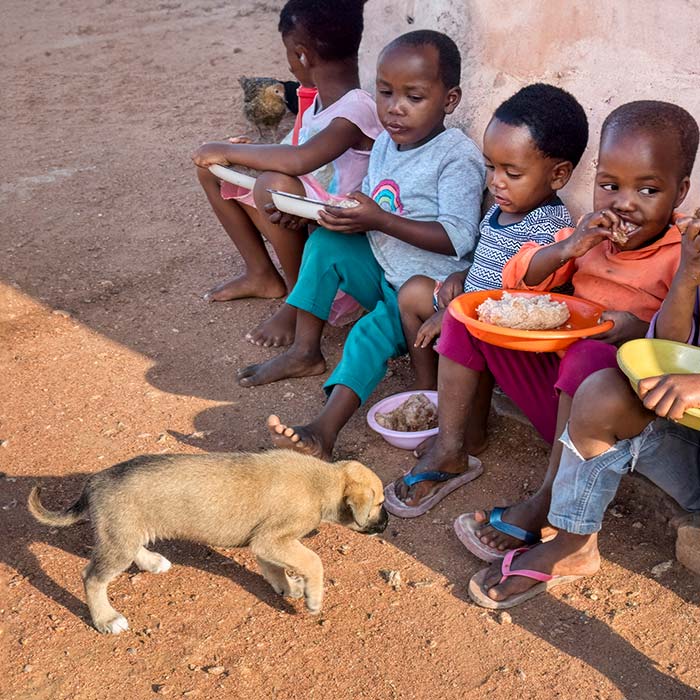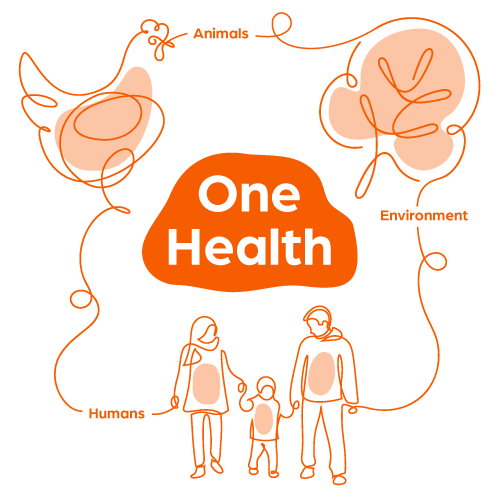
A Bite Can Be Lethal. We’re Working to Eliminate Rabies.
The goal: By the end of 2030, no human will die from a bite or scratch from a dog with rabies.1
“This is an ambitious goal set by World Health Organization and others, but we need an ambitious goal to raise awareness and to remind us that rabies kills nearly 60,000 people a year – many of whom are children,” 2 said Caitriona Fenton, who is on the forefront of One Health efforts for Zoetis.
Rabies is an infectious disease (EID) that has plagued communities for centuries.3 “It also is a great example of the need for a One Health approach to stop EIDs in their tracks,” said Caitriona.

Protecting one to protect them all
Rabies in dogs and cats is 100% preventable through proper vaccination.4 But vaccination alone will not solve the problem. A broader, more comprehensive approach is required. And that approach is One Health.
“One Health builds on the understanding that governments, agencies, companies and communities must come together to truly fight EIDs, including rabies,” said Caitriona.
Although rabies has been nearly eliminated in dogs in many developed countries, it continues to be a big problem in dogs living in about 150 countries, mainly in Africa and Asia.5 A One Health approach brings together multiple components, such as vaccines and medical treatments for animals and humans, education, resources, programs, support services and more, to holistically address the problem.
“Animals, people, the environment – all three are interconnected,” said Caitriona. “Protecting one helps protect them all.”
‘I was in a bubble’
Before joining Zoetis, Caitriona spent many years in Ireland working in veterinary hospitals and laboratories, but it was an assignment in Australia that opened her eyes to the danger of EIDs.
“Australia was experiencing an outbreak of the Hendra Virus – a devastating infection that causes respiratory and neurological problems in horses and, although rare, can be passed to humans. Up until that point, I was in a bubble. I’d never seen anything like this virus before.”
For the first time, Caitriona became keenly aware of how diseases in animals can travel – and the importance of collaboration between many disciplines to shut down that route. Years later, she would discover it was a vaccine from Zoetis that helped curb the Hendra crisis.
Partnering to prevent emerging infectious diseases
Zoetis collaborates with many organizations, governments and communities as part of a One Health approach to fighting infectious diseases, including:
- As one of two suppliers providing rabies vaccines to the Rabies Vaccine Bank from the World Organisation for Animal Health (WOAH) – a supply agreement that continues through 2025
- Research partnerships with Texas A&M University to operate the university’s Transboundary and Emerging Disease Vaccine Development facility, and research programs with key universities studying vaccine development against African Swine Fever
- Educational and awareness activities to support communities, including activities related to World Rabies Day in countries around the world6
“One Health is not an exclusive approach. It is inclusive,” said Caitriona. “Everyone has a part to play, whether you are a scientist, a veterinarian or member of a community. EIDs affect all of us.”
Published on November 1, 2023
References
1 Zero by 30: the global strategic plan to end human deaths from dog-mediated rabies by 2030 (who.int)
2 Global Rabies Work | Stories & Features | NCEZID | CDC
3 Rabies History (news-medical.net)
4 World Rabies Day | CDC
5 A Neglected Tropical Disease | United Against Rabies Forum
6 Zoetis Indonesia Celebrates World Rabies Day 2022 | Zoetis